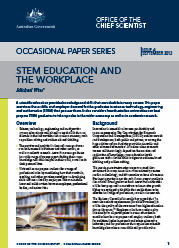
|
News & Views item - September 2012 |
![]() Office of the Chief Scientist Issues "Occasional Paper" on STEM Education.
(September 11, 2012)
Office of the Chief Scientist Issues "Occasional Paper" on STEM Education.
(September 11, 2012)
The 4th in the series of what the
Office of the Chief Scientist has termed "Occasional
Papers",
STEM Education and the Workplace![]() ,
authored by Michael West of the OCS was released earlier this month.
,
authored by Michael West of the OCS was released earlier this month.
The paper summarises:
A scientific education provides knowledge and skills that are valuable in many careers. This paper examines those skills, and employer demand for the graduates in science, technology, engineering and mathematics (STEM) that possess them. It also considers how Australian universities can best prepare STEM graduates to take up roles in the wider economy, as well as in academic research.
And Concludes:
The pace of modern economic competition dictates that no company or country can afford to stand still. Innovation, particularly through the application of science and technology, is central to maintaining productivity, economic growth, and our standard of living. In turn, preserving and improving our capacity for innovation depends upon a steady supply of STEM workers, both in stem core occupations, and in other roles where their skills can add value.
STEM education can deliver value to the Australian economy by preparing STEM
students for a range of careers. This includes ensuring the STEM skills that are
in demand are effectively taught to students; equipping students with generic
skills that will help them function in non-academic settings; and signalling
that pathways outside academic research are valid options. Monitoring overseas
initiatives on these topics can provide helpful lessons for our system.
In 1990, American science author Carl Sagan wrote that “We live in a society
exquisitely dependent on science and technology, in which hardly anyone knows
anything about science and technology.” The first part of the statement is
undoubtedly still true. It is our collective task to ensure that the second part
does not become true in Australia.
The 4-page paper does not go into the matter of how to assist a nation's population to become knowledgeable, to the extent of being appreciative of science, maths, engineering and technology or the primary and secondary schooling required to develop a firm foundation.
One suggestion:
Tom Kalil, Michele Cahill and Sue Spradley
Discuss 100Kin10 and USignite as
In their presentations to President Obama's Council of Advisors of Science and Technology after PCAST Co-chair Eric Lander's 1'30" introduction, Tom Kalil gives an 11 minute overview, followed by Michele Cahill who outlines the workings of 100Kin10 (12'40"-29'10") and then Sue Spadley explains the goals of USignite (29'15"-51'35") followed by Q&A.